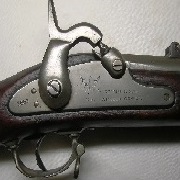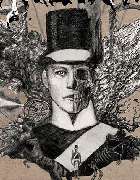KYOON GRIFFEY JR posted:they still looted food, the Sharpe books are a little absurd about that, but it was like, marginal looting versus the French Army's deliberate strategy of living off the land, and it was punished fairly severely if found Looting for food wasn't as bad as the French was and hell (most) of the time they got food through thanks to the pretty decent supply mule train they had going. It really was only a problem if the French decided to go on the offensive and everyone had to go force march.
|
|
|
|
|

|
| # ? Jun 9, 2024 13:27 |
|
I think you're right when you point out the fact that a TV show, even one as long as this documentary, has a limited amount of time to address things. But in some cases they omit things that are crucial. Here, case in point - I mentioned Tonkin Gulf, above. The show says: quote:On July 30, 1964, South Vietnamese ships under the direction of the U.S. military shelled two North Vietnamese islands in the Gulf of Tonkin. That's a very standard recount of Tonkin Gulf, but it is missing one huge fact: Operation 34A. In very, very brief terms the South Vietnamese weren't just "shelling North Vietnamese Islands." And the Maddox wasn't just "intelligence-gathering." The fact is that the South Vietnamese had just sent US trained troops to destroy a North Vietnamese naval installation - a radio transmitter - in North Vietnam, and the US Navy was covering them. This was part of a larger plan to infiltrate North Vietnam, attack their territory, sabotage their military, etc. BEFORE what is generally seen as the start of the war. This isn't secret stuff, hell, there's a Wikipedia article on it and there is all sorts of corroborating evidence that this sort of thing was going on. I think that sort of info - that the USA had set up a program to infiltrate, sabotage, and attack North Vietnam itself before 1965 - is important. This wasn't a North Vietnamese attack on a US ship just sitting and listening to radio traffic, it was a response to a US-initiated attack before the war was really going. YES, Burns was critical of the USA at many points, but it felt like he really held back and stuck with a more conventional narrative that failed to give the viewer important context. Cessna fucked around with this message at 19:07 on Jan 23, 2019 |
|
|
|
Phanatic posted:First time I've seen the Smothers Brothers credited with that song. You're right, I'll fix that. I got all excited to talk about stuff I'm into and typed too fast. Cessna fucked around with this message at 18:39 on Jan 23, 2019 |
|
|
|
SlothfulCobra posted:trying to read about the bad things that Henry Kissinger did was that a whole lot of it seems like just a regular fixture in how America deals with foreign nations today. Were we not meddling in other nations affairs like we are now before Vietnam? Did Kissinger start that? Oh god no. The Dulles brothers (note the name of the DC airport) got us involved in a proto-Vietnam in Central America to protect fruit companies profits. I’ve read period accounts of USMC aviators using military aged men on jungle trails for strafing run target practice. poo poo was all kinds of hosed up. Before that we were also loving around in China pretty much because everyone else was. The Boxer Rebellion was weird as gently caress. We also occupied the Dominican Republic. I forget why. I think debt? Haiti too although that was to protect American property during unrest in the area. Oh then you have our early 20th Century “interventions” in northern Mexico which included an amphibious landing and a relatively large invasion of northern Mexico. Let’s also not forget the ongoing meddling in Cuba’s affairs following us peeing it off Spain’s empire. Oh and we basically astroturfed an independence movement in Panama when the Colombians (which it was part of) didn’t want to let us build the canal. The Philippines were basically a colony and we fought an on again off again insurgency there. Oh yeah in the late 1890s we landed marines in Hawaii during an attempt to overthrow their monarchy (which was almost certainly fomented by us) to “protect American interests” but which was also there to promote a government that had Sanford Dole as a prominent leader. One guess what business Mr Dole was involved in. Then you’ve got Perry “encouraging” japan to open up to international trade. It goes on and on.
|
|
|
|
Cessna posted:I think you're right when you point out the fact that a TV show, even one as long as this documentary, has a limited amount of time to address things. But in some cases they omit things that are crucial. Personally i think thats a fine summary, it hits the following neccesary points specific to understanding the incidents context: 1: South Vietnam was attacking North Vietnam with the direct connivance of the US supporting forces. 2: The Maddox was engaged in a mission to further enable and support further such actions (attacks) by the South Vietnamese against the North. Elsewhere in the episode and the previous episode the actions of the US in supporting and aiding the ARVN directly with both training and support, including direct helicopter flights to fights they are having with the North both in the South where the North were attacking and in the North. Hence we have fairly plainly the idea that the North Vietnamese could well have been perfectly justified in their (presumed) belief that the Maddox was a reasonable target when they attacked, that to me is exactly the information that needs to be communicated. They could have gone into more detail but again with runtime constraints i think that it is reasonable to not include matters on that level of detail, im sure there are dozens of such additional details which are interesting and need to be covered but not in the context of the documentary. That is not a glaring ommission, its a summary of the important factors. I'm not saying you are wrong to point out its shortcomings and details that people should learn more about, but i think you are laying more sins that are inherent to any work of its type at its door of the documentary than its actually earned, every part of your entirely correct summary of how the US hosed up vietnam is covered to a greater or lesser detail by it, but so are many other very important factors. Anyone going into a historical documentary shouldnt treat it as the last word on the matter but as a general narrative and a starting point to learn more if they want to, but this is something that in my view people should know already and in the way you pointed it out you were giving it a huge amount of stick i really dont think it deserves.
|
|
|
|
Cyrano4747 posted:Oh god no. The Dulles brothers (note the name of the DC airport) got us involved in a proto-Vietnam in Central America to protect fruit companies profits. War is a Racket by Marine General Smedley Butler. (Who won the Medal of Honor - twice.) Cessna fucked around with this message at 19:15 on Jan 23, 2019 |
|
|
|
Cyrano4747 posted:Oh god no. The Dulles brothers (note the name of the DC airport) got us involved in a proto-Vietnam in Central America to protect fruit companies profits. https://www.youtube.com/watch?v=HHhZF66C1Dc
|
|
|
|
Polyakov posted:Anyone going into a historical documentary shouldnt treat it as the last word on the matter but as a general narrative and a starting point to learn more if they want to, but this is something that in my view people should know already and in the way you pointed it out you were giving it a huge amount of stick i really dont think it deserves. You know, I think that's fair. I think I should stick with my earlier assessment where I call it a "101 level text." We all know what it's like to see a piece of History-media and think, "but they left out THIS! and THAT! and THIS THING I THINK IS IMPORTANT!" I suppose that's what I'm doing here.
|
|
|
|
Cessna posted:You know, I think that's fair. I think I should stick with my earlier assessment where I call it a "101 level text." There isn't anything wrong with that at all.
|
|
|
|
Just a heads up if you can get iPlayer, David Olusoga's Forgotten Soldiers of Empire is pretty good.
|
|
|
|
|
Hogge Wild posted:I've read only Sharpe stuff but no real history books about it. What sort of revisionist bullshit is this?
|
|
|
|
Cyrano4747 posted:We also occupied the Dominican Republic. I forget why. I think debt? Haiti too although that was to protect American property during unrest in the area. More angry folk songs needed on this topic. https://www.youtube.com/watch?v=CB4xpqNSYpk "There's been a drastic change in US foreign policy in recent months. Take the Dominican Republic, which we did."
|
|
|
|
Cessna posted:[FMJ stuff] As an aircraft nerd I'm willing to write off the Wessex/Chocktaw thing. The Wessex is a Whirlwind derivative which is a Chocktaw derivative, it's technically only the wrong variant of the right helicopter. Additionally it looks mostly fine in the film and by 1987 most of the actual Chocktaws still around were becoming somewhat structurally questionable. It's possible that Kubrick could have gotten some from the Belgian Air Force, I'd need to check my dates, but I doubt there were any others left flying in Europe.
|
|
|
|
Vahakyla posted:Averaging out, it's pretty safe to say that for all groups of people, life is overall better today. Less death from famine, war, illness, and other similar metrics. And tomorrow is very likely going to be even better. It's just an optimistic way to look at the reasons to continue with social progress and not fall on the "ugh we are falling apart"-bitching. There are groups who no longer exist
|
|
|
|
And we're staring down the possibility of runaway climate change
|
|
|
|
brugroffil posted:unrelated, but the dumb government shutdown and the coast guard not getting paid (because they're under DHS instead of DOD because...?) has me wondering when regular pay became the norm for soldiers. From listening to Mike Duncan's History of Rome and reading Battlecry of Freedom recently, my impression is that soldier pay was very irregular back then. How did families back home make ends meet if the pay wasn't coming home regularly? HEYGAL, how did the pay work for your mercenary groups? Pay was irregular for the regiment I study that went to Italy because the commanders had terrible finances and the governor of Milan was trying to screw them, but during the 1620s pay seems to have been regular in the rest of the Saxon army. Once every few months everyone is mustered in, they're counted, and the Saxon Kriegscommissarius hands over the pay. That official, the captain, and the musterschreiber all sign off on it, which is where I come into the picture because this is what I can see. Everyone involved was surprisingly on top of things. It was in the 1640s that the Saxon government went bankrupt and the troops ended up supporting themselves directly--but even so they could maintain a small army indefinitely. The entire Saxon army was payed off and mustered out over '50 and '51. How people would finally pay off the troops was a large part of the negotiations for the armistice. HEY GUNS fucked around with this message at 01:18 on Jan 25, 2019 |
|
|
|
Nebakenezzer posted:Oh gently caress they are similar, aren't they HEY GUNS fucked around with this message at 21:39 on Jan 23, 2019 |
|
|
|
Hogge Wild posted:To continue, when did the armies start to give tobacco rations, and how much were they in WW2 for different countries?
|
|
|
|
FrangibleCover posted:I've got a bit of a question, why did tankers change from 1811 to 1812? It seems like an odd thing to do. Thanks for reading that! 1811s are M60A1 crew; this MOS no longer exists. 1812 are M1A1 crew. Some of the MOS names/codes are great: 2871 - Estonian Linguistic Specialist 5523 - Musical Instrument Repair Technician 5574 - Melophone Bugle Musician 8056 - Hazardous Waste NCO And, yes: 8878 - Historian
|
|
|
|
Cessna posted:8878 - Historian
|
|
|
|
HEY GUNS posted:if we ever get a gang tag Shirts are available.
|
|
|
|
brugroffil posted:There are groups who no longer exist If you want to make it tautologically impossible for things to get better because you can't unkill the people already killed and ungenocide the peoples already genocided, then okay. But at that point you are just devolving from the very reasonable point that you shouldn't be complacent - which literally no one has argued for, mind - to meaningless pedantic nihilism.
|
|
|
|
HEY GUNS posted:Everyone involved was surprisingly on top of things. It was in the 1640s that the Saxon government went bankrupt and the troops ended up supporting themselves directly--but even so they could maintain a small army indefinitely. The entire Saxon army was payed off and mustered out over '50 and '51. How people would finally pay off the troops was a large part of the negotiations for the armistice. A big hassle at the end of 30YW from the viewpoint of Sweden was about how to pay off their mercenaries so that the peace would exist not only on paper. The native regiments were few and they were on infinite service anyway, the mercenaries were the ones who had to be paid real money there and then.
|
|
|
|
Nebakenezzer posted:As someone who also lives in the grim and frostbitten north, can I just say "get in the sea" is a great way to say "gently caress off and die." Ghormley approached command as a bureaucratic exercise. He had a very narrow scope of focus at that. For example, he was assigned a command ship parked at Noumea and stayed there for his entire tenure. It was cramped and poorly equipped to host a busy headquarters engaged in land, sea, and air combat over hundred or thousands of miles of ocean. To him, the Guadalcanal campaign was an endless series of messages about supply shortages and casualties. When Halsey took over he actually visited the damned island they were fighting over. He also kicked the French governor out of his villa and took it over as his HQ. Between better facilities and a first-hand appreciation about conditions on Guadalcanal he had an entirely different viewpoint on the campaign. He viewed it as a struggle against an enemy he could hurt, not as a depressing paperwork exercise. He saw with his own eyes that conditions were rough, but the troops were willing to take it; supplies were low, but they could make do. Ghormley wasn't the least bit aggressive. Halsey was, if anything, too aggressive. If he'd lost a battleship to torpedoes in confined waters we'd have never heard of him again. But he did have a fine sense of what you actually do with a military force: hit the enemy at every opportunity. Halsey's most famous order, turning Fletcher's carriers loose was "Strike. Repeat, strike." That's exactly what you do, send your subordinate commanders out with instructions to actually fight the enemy. Oddly, he gets credit for a simplistic (but morale boosting) order like that, while Callahan was criticized for calling out "We want the big ones" at the Friday the 13th battle; a target allocation order is arguably the most important guidance a commander can give in a naval battle (see also Dogger Bank in WW1). I should dig up my notes on Callahan, I last posted about him 2 threads ago. So to summarize, Ghormley was a bureaucrat in a situation that needed a fighter. A combat leader needs a proper perspective and an aggressive attitude. Once a combat leader was installed, the Allied forces started winning, not just hanging on.
|
|
|
|
On the other hand, Spruance was a much better commander than Halsey, and Spruance viewed war as an intellectual exercise above all else. He was aggressive, but everything he did was calculated and he wasn't as prone to chasing bait as Halsey. One of Japan's few surviving admirals with sea experience said after the war that the IJN feared Spruance much more than Halsey. Halsey was bold and aggressive to the point of recklessness, and he was very predictable. Spruance, they regarded as a consummate professional who was impossible to manipulate or trap or panic, and always went after sensible goals with great force without sacrificing his dispositions anywhere else - you might not know what Spruance is going to do next, facing him, but he'll always do something intelligent that makes sense, and he's never going to overextend himself.
|
|
|
|
Cythereal posted:On the other hand, Spruance was a much better commander than Halsey, and Spruance viewed war as an intellectual exercise above all else. He was aggressive, but everything he did was calculated and he wasn't as prone to chasing bait as Halsey. Read The Quiet Warrior if you have not. The guy was loving brilliant.
|
|
|
|
Ataxerxes posted:A big hassle at the end of 30YW from the viewpoint of Sweden was about how to pay off their mercenaries so that the peace would exist not only on paper. The native regiments were few and they were on infinite service anyway, the mercenaries were the ones who had to be paid real money there and then. one gets the impression that the Swedish army had overextended itself quite a bit, and nobody knew what they were doing in Germany any more
|
|
|
|
EvilMerlin posted:Read The Quiet Warrior if you have not. The Fleet at Flood Tide also focuses on Spruance as the primary leadership figure in the field for the US in the Pacific.
|
|
|
|
brugroffil posted:unrelated, but the dumb government shutdown and the coast guard not getting paid (because they're under DHS instead of DOD because...?) has me wondering when regular pay became the norm for soldiers. From listening to Mike Duncan's History of Rome and reading Battlecry of Freedom recently, my impression is that soldier pay was very irregular back then. How did families back home make ends meet if the pay wasn't coming home regularly? HEYGAL, how did the pay work for your mercenary groups? During the second Anglo-Dutch war, English sailors were paid in tickets, for future redemption. Not surprisingly, they ended up selling those tickets for large discounts, and brokers and lenders made a lot of money. It comes up a lot in Pepys' diary, as sorting out pay was his jobs. The dockyards had a similar problem, but they were able to appease workers by relaxing the definition of "chips". Chips were the unused off-cuts of wood that labourers were allowed to take. The definition of a chip became pretty relaxed. In the early eighteenth century they tried to limit the amount of wood taken per worker as the amount they could carry off the site in one load once a week, and workers rioted. I've read that the value of chips considerably exceeded wages, and labour disputes focused much more on the former than the latter.
|
|
|
|
Talking of history tv documentaries https://twitter.com/scottygb/status/1088185660379488263?s=19
|
|
|
|
Mr Enderby posted:During the second Anglo-Dutch war, English sailors were paid in tickets, for future redemption. Not surprisingly, they ended up selling those tickets for large discounts, and brokers and lenders made a lot of money. It comes up a lot in Pepys' diary, as sorting out pay was his jobs. The dockyards had a similar problem, but they were able to appease workers by relaxing the definition of "chips". Chips were the unused off-cuts of wood that labourers were allowed to take. The definition of a chip became pretty relaxed. In the early eighteenth century they tried to limit the amount of wood taken per worker as the amount they could carry off the site in one load once a week, and workers rioted. I've read that the value of chips considerably exceeded wages, and labour disputes focused much more on the former than the latter. I love these bizarre stories of unintended consequences unrelated the other day I came on this amusing entry from the diary of an English traveler Joshua Brookes describing a candid conversation he had with Thomas Jefferson in 1799, in which Jefferson gives his opinion on George Washington: quote:George Washington is a hard master, very severe, a hard husband, a hard father, a hard governor. From his childhood he always ruled and ruled severely. He was first brought up to govern slaves, he then governed an army, then a nation. He thinks hard of all, is despotic in every respect, he mistrusts every man, thinks every man a rogue and nothing but severity will do. He has no idea of people being left to themselves to act; he thinks that they cannot think and that they ought only to obey. As I lived near him and saw him every day, I thought I knew what was in his mind at that time, but afterwards I found that ideas were there that I had no conception of. If he had died when Congress met in New York, he would have been the greatest man that ever lived, but he is now losing his reputation daily. He is not the man he was, else he would not allow himself to be led as he does, or give his sanction to things he does sanction. He has divines constantly about him because he thinks it right to keep up appearances but is an unbeliever. Jefferson almost comes across as a gossipy neighbor, like he might as well be complaining that Washington doesn't cut his grass often enough or that his Christmas lights were too bright.
|
|
|
|
Squalid posted:Jefferson almost comes across as a gossipy neighbor, like he might as well be complaining that Washington doesn't cut his grass often enough or that his Christmas lights were too bright. quote:If he had died when Congress met in New York, he would have been the greatest man that ever lived, but he is now losing his reputation daily... anyway speaking of things getting better if we work at it: i learned last night there's an Ebola vaccine now HEY GUNS fucked around with this message at 00:20 on Jan 24, 2019 |
|
|
|
There was an ebola virus before too- mitch hedberg E: drat it!
|
|
|
|
Polyakov posted:I believe you are misinterpreting that statement, i just went back and watched the opening crawl and you are taking one line from it and not considering the entirity of what is said. That particular statement is explicity in reference to 1945 (as mentioned in the opening crawl it is considering a 30 year timespan of 1945-1975) and the actions taken then, nearly a decade before Diem even came to power and nearly two decades before Tonkin. It is a much more reasonable thing to say about US's somewhat naieve attempts to as they saw it "help" south east Asia directly after WW2 than it is about the actions of Kennedy and Johnson in the 1960's which is what i presume (correct me if i am wrong) you are taking it to refer to. Indeed the remainder of the narrative of the first episode goes on to examine how and why from the starting point of generally supporting self determination when they went in originally to help against the Japanese they got sucked inexorably into the fight they ended up in. Wasn't the 1945 war an almost entirely colonial war? I thought American involvement was mostly in support of French colonialism, but then I am but an egg. Also I would just like to mention I just read a generally good natured and constructive discussion of American politics on the internet in 2019 and found it useful in better understanding Nazi Germany, so thank you all.
|
|
|
|
Milo and POTUS posted:There was an ebola virus before too- mitch hedberg
|
|
|
|
Jefferson seems like he would've been the most frustrating guy to work for. He held others to a higher standard than himself and also was top of the pile of paranoids afraid that any and all federal power was just going to mean the return of monarchism. And of course, he led the charge in establishing the divisive factionalism that was the birth of America's party system, and even employed America's first muckraker, so of course he had a lot of petty complaints about people who weren't in his camp.
|
|
|
|
Cyrano4747 posted:Oh god no. The Dulles brothers (note the name of the DC airport) got us involved in a proto-Vietnam in Central America to protect fruit companies profits. I would draw a distinction though between American foreign interventions before and after WWII. The small wars in Latin America were certainly not conducted for altruistic motives, and in the long turn they had some definite negative effects like the legacy of a disproportionately powerful military left behind after the occupations. However these interventions tended to be very small in scale, with very limited objectives. The first American occupation of the Dominican Republic for example had roughly 2,000 marines occupying the country for eight years, and there was very little fighting. In the Dominican Republic and other countries, the interventions were prompted due to civil wars and coups and the disastrous state of local finances that made repaying debts owned to American creditors impossible. To make sure America got paid, the interventions tended to stabilize the countries in question, pragmatically straightening out the state budget and professionalizing administration. Typically they left following real honest elections, which was more than could be said before they arrived. Again I don't want to say these wars were good, but its hard to argue they left the countries in question worse off than they were before US forces got involved. By contrast, after WWII US interventions just go bonkers. Like just look at all the crazy poo poo the CIA got up to in Indonesia. There was no restraint at all, the objective of defeating communist ideology was so expansive as to justify anything. In the 1930s military handbooks on interrogation were extremely boring and almost modern in their tone. They like recommend you earn the subjects trust, absolutely no torture, get information. After WWII, the CIA handbooks that are available are just brutal and cruel instructions for terrorizing civilian populations into obedience. I'm not sure what causes the change but I suspect it has something to do with the total war mentality American leaders developed in WWII, and it carried into especially the early Cold War covert tactics. There's no sense of restraint at all, bombing civilian shipping? Why not. Handing prepared lists of suspected communists to the paramilitary executioners? Hell Yeah. Nor is there any sense of long-term planning, no concern at all about fostering democracy or ensuring civil peace and order, none of that mattered anymore. After Vietnam things are a bit more restrained again, though its more they just realized they had to be subtler.
|
|
|
|
mllaneza posted:Halsey's most famous order, turning Fletcher's carriers loose was "Strike. Repeat, strike." That's exactly what you do, send your subordinate commanders out with instructions to actually fight the enemy. Oddly, he gets credit for a simplistic (but morale boosting) order like that, while Callahan was criticized for calling out "We want the big ones" at the Friday the 13th battle; a target allocation order is arguably the most important guidance a commander can give in a naval battle (see also Dogger Bank in WW1). I should dig up my notes on Callahan, I last posted about him 2 threads ago. Trent Hone's book on the development of USN tactics has an excellent section on Callaghan's intentions and why he acted the way he did at 1st Guadalcanal: he knew his cruisers were outgunned by Hiei and Kirishima at anything but point-blank range so he was desperately trying to stay unseen as long as possible. Unfortunately his force had no chance to work as a team prior to the battle and his choice of cruising formation was bad and all hell broke loose instead.
|
|
|
|
So I'm starting the Ken Burns Vietnam thing now. The music is just going to be wall-to-wall boomer No spoilers, plz!
|
|
|
|

|
| # ? Jun 9, 2024 13:27 |
|
^^ There's some very nice string quartet music with Yo Yo MaSqualid posted:After Vietnam things are a bit more restrained again, though its more they just realized they had to be subtler. Maybe before the people in charge kept a short leash on these operations, and after everybody was all "SOMETIMES YOU HAVE TO SPILL A LITTLE MILK TO SAVE THE AMERICAN PIE" Vietnam I think brought back government oversight for a time Iran-Contra was after all the executive running this incredibly awful operation by selling arms to America's enemies after Congress specifically ordered it shut down
|
|
|



































